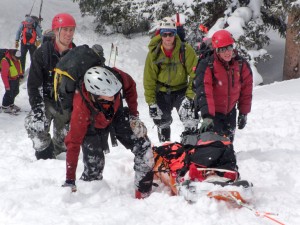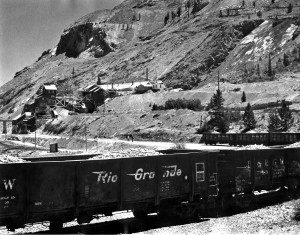by John Orr
Taylor River rafting rift comes full circle
The epic saga, termed “row vs. wade” by some opponents, ended up with a deal for this season between Wilder on the Taylor fishing reserve owners Jackson-Shaw and the owners of the two rafting operations, Three Rivers Outfitting and Scenic River Tours.
Hours of operation will be limited for the outfitters, generally during the middle of the day. A portage will be allowed around a bridge on the fishing reserve as a nod to safety during high water. The outfitters promise to police their operations strictly so as not to jeopardize their permits from the U.S. Forest Service or the agreement with Jackson-Shaw.
But the ball is still rolling for a citizen initiative solution from voters this fall. Both sides have filed petitions – 24 according to one tally – to gain access to the ballot. According to a report from the Summit Daily News, “Bob Hamel, chairman of the Colorado River Outfitters Association, said it was a nice gesture (by Jackson-Shaw) but rafters believe they don’t need Shaw’s permission to raft the river.”
The other side argues that the guarantee of rafting rights through private property constitutes a taking and therefore the landowner must be compensated.
By the way, HB 10-1188, State Representative Kathleen Curry’s bill that sought to clarify Colorado law with respect to the Taylor River situation died an ugly drawn-out legislative death in conference committee the day before the end of the legislative session. Not enough members of the conference committee could agree to move it on for a final vote. Representative Curry told The Grand Junction Daily Sentinel, “What we tried to do with this bill was relate the statutes with reality.”
Curry who faces reelection this fall also added, “Tensions are up back home, but I couldn’t help them,” according to The Denver Post.
Snowpack and runoff
Snowpack in the Arkansas River Basin has been sitting at above average most of the water year so runoff should be just fine. As we go to press predictions for the runoff on the Arkansas is 90% of average or above.
The Bureau of Reclamation is expecting Fryingpan-Arkansas yield between 40,000 and 50,000 acre-feet through the Boustead Tunnel over the summer. That’s about the total from prior years with a similar snowpack.
All that bodes well for this year’s edition of FIBArk June 17-20 when another phalanx of boaters try to win the 26-mile main event down the Arkansas River.
Municipal and agricultural storage around the state is at the highest level since 2001, according to Mike Gillespie from the Natural Resources Conservation Service’s office in Denver.
Ray Wright and Doug Shriver
The San Luis Valley lost two longtime residents in a terrible tragedy in March. The two friends were working together clearing snow off the roof at Wright’s cabin and were buried by snow.
Wright was president of the Rio Grande Water Conservation District and a member of the Interbasin Compact Committee.
Shriver was on the Colorado ground Water Commission and served as president of the Rio Grande Water Users Association.
Floyd Dominy
Former U.S. Bureau of Reclamation director Floyd Dominy passed away April 23 at the age of 100. Look around the western U.S. and you’ll find ample evidence of his dream to fully develop the streams of the west. Blue Mesa Dam, Glen Canyon Dam, Flaming Gorge Dam and Navajo Dam all took their place in the complex plumbing of the Colorado River Basin during Dominy’s tenure.
Stewart Udall
Dominy’s boss at Interior during the Kennedy and Johnson administrations – Stewart Udall – died in March. Several of the most far-reaching legislative efforts of the time were co-authored by Udall including the Wilderness Act of 1964. The Colorado Independent reported, “During his eight years as Secretary, the National Park System expanded to include four new national parks, six new national monuments, eight seashores and lakeshores, nine recreation areas, 20 historic sites, and 56 wildlife refuges. In other words, Udall expanded the number of stunning natural places where you can spend weeks pulling fish out of rivers or just strolling around and thinking and breathing without ever catching a an industrial-life rash.”
Chips Barry
The longtime head of Denver Water died in early May in an accident at his farm in Hawaii. Barry led the Front Range utility during its transition after the defeat of the 1.1 million acre-foot Two Forks Reservoir planned for the confluence of the South and North forks of the South Platte River.
In an interview with Colorado Central last spring Barry expressed the current attitude of the utility under his direction, saying, “Everyone may not get all the water they want but we can probably work it out to get the water we need.”
Short takes
• Colorado irrigators that divert out of priority from surface water now face fines if they are caught. The State Engineer can fine an illegal diverter $500 per day thanks to the Colorado Legislature passing Senate Bill 10-027.
• Inspections for invasive aquatic species are now mandatory in Colorado for all boats. Readers can find more information at www.wildlife.state.co.us/Fishing/MandatoryBoatInspections.htm
• Back in April folks in Creede held a 6k running event – The High Country Hustle – to raise dough for the fight against the global water crisis. The event was the brain-child of 17-year-old Forrest Getz. Money raised went to the Live Earth project. The Valley Courier reported, “The 6k distance is important because it is the average distance many women throughout the world walk every day to secure drinking water.”
• The Bureau of Reclamation are shooting for 3,883 cfs through the Black Canyon for this year’s peak flow. The target flow comes from a formula specified in the 2008 agreement for peak, shoulder and minimum flows in the river through the national park. This will mean a spill at Crystal Dam for the third year in a row.
• A qualified congratulations is due George Whitten the new president of the Rio Grande Water Conservation District. Whitten was elected unanimously at the first meeting after the death of Ray Wright who passed away in March.
• Congratulations to Mike King. Governor Ritter named him to replace Jim Martin in the executive director’s hot seat at the Colorado Department of Natural Resources. Mr. King has served in a number of positions at DNR since 1999, most recently as Deputy Director.
• Congratulations to Aspen attorney Alan Schwartz. Mr. Schwartz was named to the board of Great Outdoors Colorado – the organization that distributes Colorado lottery funds for open space and parks.
• April 22 marked the 40th anniversary of Earth Day. From its beginnings as a U.S.-only celebration, Earth Day is now coordinated globally by the Earth Day Network and is celebrated in more than 175 countries every year.
John Orr follows Colorado Water issues at Coyote Gulch http://coyotegulch.net



